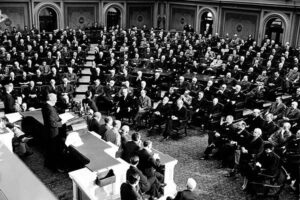Why Should We Teach Lincoln's Gettysburg Address?
On November 19, 1863, President Abraham Lincoln delivered “a few appropriate remarks” at the dedication of the Soldiers National Cemetery at Gettysburg, Pennsylvania. The inspiring prose of Lincoln’s Gettysburg Address has proven to be a boon to American teachers ever since: generations of older Americans memorized the speech in their school days. English teachers liked the precision and beauty of the language. Rhetoricians love the majesty of Lincoln’s prose, and history teachers no doubt welcomed the opportunity to teach a primary source short enough to fit into their tight schedules.
Then the typical focus of history classes was on Great Men and Great Events. Increasingly, today’s emphasis is on engaging students with lesser-known voices: the soldiers who fought at Gettysburg, civilians who endured the battle and, its brutal aftermath, slaves freed by Lincoln’s Emancipation Proclamation. Such a goal is laudable. Yet English teachers may still like the precision and beauty of the language, and history teachers no doubt have more to fit into less time than their predecessors. Therefore, as American history teachers required to pick and choose which documents to use with our classes, we must ask: Why should we teach the Gettysburg Address? What does Lincoln have to say to modern students? What lessons can 21st century audiences glean from a document now over 150 years old?
The Gettysburg Address is an excellent primary source for a skills-based lesson that asks students to contextualize the document and identify the author’s audience, purpose, and point of view. Many students can place Lincoln’s speech in the context of the Civil War and the battle of Gettysburg as a turning point in the war. They likely need help in understanding why Lincoln was not the featured orator at the cemetery dedication and what expectations 19th century Americans had for such an event.
Asking students to think about the setting helps them identify the types of people in the audience. The battle was in July, the cemetery dedication in November. What must the intervening months have been like for the citizens of Gettysburg? Was Lincoln trying to give meaning to what these citizens had endured? What about the broader audience? The war had dragged on far longer than anyone had expected with horrific casualty counts. Was Lincoln thinking about this carnage when composing his remarks? He knew, of course, that the victories at Gettysburg and Vicksburg happened simultaneously in the public’s mind. Why did he not revel in those triumphs? Why only mention them as “the work thus far so nobly advanced?”
These contextualization and audience questions set the stage for an in-depth analysis of Lincoln’s purpose and point of view. Why did Lincoln date the founding of the nation in 1776 with the Declaration of Independence and not 1787 with the writing of the Constitution? Historian and journalist Garry Wills argues that Lincoln’s use of the Declaration of Independence as “a matter of founding law” was “one of the most daring acts of open-air sleight of hand ever witnessed by the unsuspecting. Everyone in that vast throng of thousands was having his or her intellectual pocket picked.” Wills contends that Lincoln reframed the Constitution by incorporating the spirit of the Declaration’s self-evident that “all men are created equal” into a new and improved version. Is Wills right? Did Lincoln alter the very nature of the Union he was striving to preserve by claiming a dedication to equality was more significant than the Constitutional compromises with slaveholding states?
Wills assumes that Lincoln’s speech contains only ONE proposition. In fact, a careful examination of the text points to two propositions, not one. First is the proposition that the nation’s founding was “dedicated to the proposition that all men are created equal.” The second is that political and civil equality was a necessary pre-requisite for a nation committed to the “government of the people, by the people and for the people.”
Many Americans today, including many professional historians, assume that the Founders were thinking only of the equality of white men when they endorsed the Declaration of Independence. Lincoln had long argued against this assumption. He believed the Founders meant what they said when they proclaimed that all men are created equal and that they defined with “tolerable distinctiveness” how all men were created equal. That they were entitled to “life, liberty, and the pursuit of happiness.” Was Lincoln suggesting that a government resting on the consent of the governed was being tested in the Civil War? Can a nation be ruled by the consent of the governed with a significant portion of its human population enslaved?
This probing analysis not only helps students understand the Gettysburg Address as it was understood by the people alive at the time the speech was delivered, it helps students consider the nature of equality, liberty and a republican form of government predicated upon the consent of the governed.



